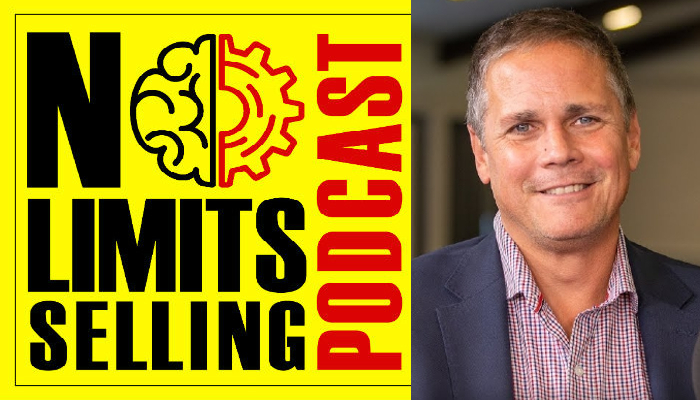3 Ways to Master The Power of Coaching by Jon Fraser
On Episode 217 of The No Limits Selling Podcast, we have Jon Fraser, CRO at Omniconvert. Jon has over 35 years of experience in sales and leadership across a diverse portfolio of industries and geographies, most recently as VP of sales for a leadership development company where he facilitated the engagement of a talented team that helps leaders and their teams convert pressure to excellence through learning experiences that cross-pollinate the best ideas from sport, academia, business, and government.
He has a wealth of experience working with companies at various stages of the growth curve, from fast-moving start-ups to established organizations that wanted to re-imagine themselves. In addition to 25+ years of coaching and mentoring, Jon also has a wealth of experience in senior leadership positions responsible for strategy, operations, and growth.
He is passionate about helping others grow and develop themselves and brings a wealth of experience both in coaching and business strategy to his clients. Jon currently divides his time between his home in the south of France and his lakeside cabin in Ontario, Canada.

Contact Jon:
[EDITOR’S NOTE: This podcast is sponsored by No Limits Selling. It is a fun, fast-paced podcast that delivers hard-fought business advice that you can implement today to improve your sales and performance]
Interested In Our Real Estate Coaching Services? Explore Our Website: Link
Feeling Not Well Today? You Can Use Our Mindset Boosters App To amp Up Your Mood: Link
Find us on Social Media:
LinkedIn | Facebook community | Instagram
Like what do you listen to? Subscribe to our podcast!
Ready to become fearless? We can help you become fearless in 60 days so you accomplish more in your career Schedule A 15 min Call with Umar
Summary
Introduction and Background
The podcast opens with an introduction of Jon Fraser, the Chief Revenue Officer at Omniconvert. Jon has a rich background in sales, having worked in various industries such as software, telecommunications, and technology. His diverse experience has equipped him with a unique perspective on sales and customer relations, which he brings to his role at Omniconvert.
About Omniconvert
Omniconvert is a company that specializes in helping businesses optimize their conversion rates through a combination of A/B testing, personalization, and web analytics. The company works closely with its clients to better understand their customers, enabling them to make data-driven decisions that enhance their business performance.
Jon's Role at Omniconvert
As the CRO, Jon plays a pivotal role in Omniconvert's revenue generation. He oversees the sales and marketing teams, ensuring they work in harmony to achieve the company's financial goals. Jon also works closely with the CEO to develop and implement growth strategies, contributing to the company's overall success.
Sales Philosophy
Jon shares his sales philosophy, which is centered around understanding the customer's needs and providing solutions that address those needs effectively. He emphasizes the importance of building strong relationships with customers, fostering trust, and maintaining open communication. This customer-centric approach is key to his success in sales.
Challenges and Opportunities
In the podcast, Jon also discusses the challenges and opportunities in the industry. He highlights the importance of staying abreast of the latest trends and technologies to remain competitive. Adapting to changes in the market is crucial, and Jon sees these challenges as opportunities for growth and innovation.
Advice for Salespeople
Jon offers valuable advice for salespeople, encouraging them to be persistent and stay motivated, even in the face of rejection. He stresses the importance of continuous learning and self-improvement, stating that the most successful salespeople are those who are always looking for ways to enhance their skills and knowledge.
Conclusion
The podcast features Jon Fraser, the Chief Revenue Officer at Omniconvert, a company that specializes in optimizing businesses' conversion rates through A/B testing, personalization, and web analytics. With a rich background in sales across various industries, Jon brings a unique perspective to his role, overseeing the sales and marketing teams and working closely with the CEO to drive growth. His sales philosophy centers on understanding customer needs, building strong relationships, and maintaining open communication. Jon discusses the challenges and opportunities in the industry, emphasizing the importance of staying updated with trends and technologies and viewing challenges as opportunities for growth. He also offers advice to salespeople, encouraging persistence, motivation, and continuous learning.
The podcast concludes with Jon's optimism about Omniconvert's future and his commitment to helping businesses optimize their conversion rates and achieve their growth objectives.
Questions & Answers
Who is Jon Fraser and what is his role at Omniconvert?
What does Omniconvert specialize in?
What is Jon Fraser's sales philosophy?
How does Jon Fraser view challenges and opportunities in the industry?
What advice does Jon Fraser offer to salespeople?
What is Jon Fraser's outlook on the future of Omniconvert?
Don’t miss this opportunity to transform your real estate career with one-on-one coaching. As an experienced real estate coach, I, Umar Hameed, am dedicated to helping you unlock your full potential and achieve your real estate goals. To learn more about who am I and my clients ↓
If you’re ready to take the next step, book an appointment with me today and begin your journey toward success in the real estate industry.

